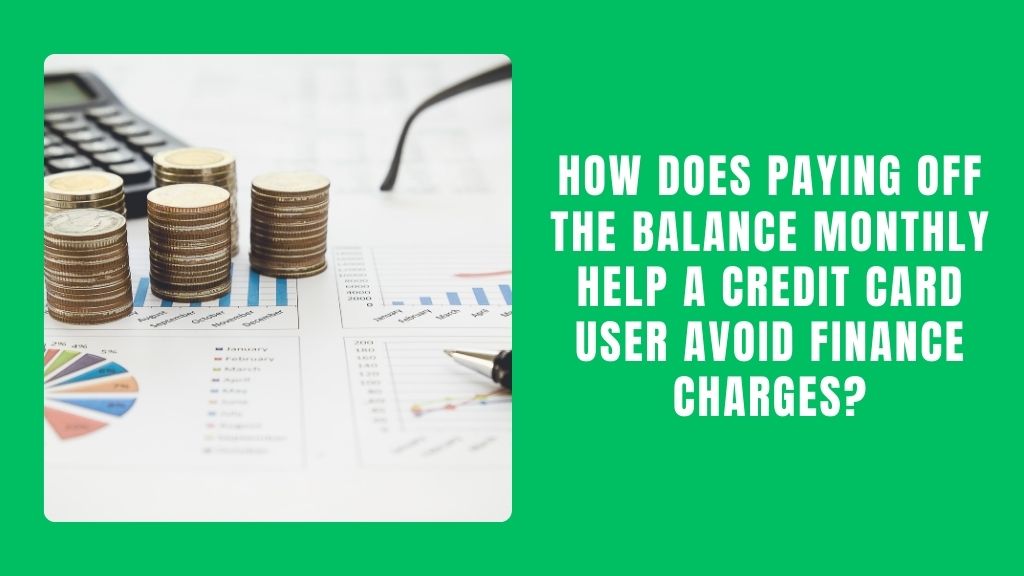Credit cards offer convenience and financial flexibility, allowing users to make purchases without carrying cash. However, they also come with the responsibility of managing payments wisely. One of the best strategies for avoiding extra costs is paying off the balance in full every month. But how does paying off the balance monthly help a credit card user avoid finance charges? The key lies in understanding how interest is applied and how timely payments can prevent unnecessary expenses.
This blog will explain why paying off your balance is a smart financial habit, how it helps you avoid finance charges, and the long-term benefits of responsible credit card use.
Understanding Finance Charges on Credit Cards
Finance charges are the interest and fees that credit card companies apply when you carry a balance from one billing cycle to the next. These charges can significantly increase the total amount you owe if not managed properly. When you make a purchase with your credit card, you are borrowing money from the bank or credit card issuer. If you do not pay back the full amount by the due date, interest is charged on the remaining balance.
Also read: Which Housing Option Gives You More Freedom and More Responsibility?
How Interest Is Calculated
Credit card interest is typically calculated using the Annual Percentage Rate (APR). The APR represents the yearly cost of borrowing money on your credit card. However, credit card companies usually apply interest daily based on the outstanding balance. The longer you carry a balance, the more interest accumulates.
For example, if your credit card has a 20% APR and you owe $1,000, the daily interest rate would be approximately 0.054% (20% ÷ 365 days). Over time, this can add up, making purchases much more expensive than their original cost.
The Importance of the Grace Period
Most credit cards offer a grace period, which is the time between the end of the billing cycle and the due date for payment. During this period, no interest is charged on new purchases—but only if you pay your balance in full. If you carry a balance, interest starts accumulating from the date of purchase, and the grace period no longer applies.
By paying off the balance monthly, you take full advantage of this grace period, ensuring that you never have to pay interest on your purchases.
Benefits of Paying Off the Balance Monthly
Paying off your credit card balance every month provides several advantages, including:
1. Avoiding Finance Charges Completely
When you pay your full balance by the due date, the credit card company does not charge interest. This means you only pay for what you purchased, without any additional costs.
2. Improving Credit Score
Timely payments and maintaining a low credit utilization ratio (the amount of credit used compared to the credit limit) positively impact your credit score. A good credit score helps in getting loans with better interest rates in the future.
3. Reducing Debt Accumulation
If you only make minimum payments, your debt continues to grow due to interest charges. By paying off the full amount every month, you avoid falling into a cycle of increasing debt.
4. Better Financial Control
Paying off the balance ensures that you stay within your budget and do not spend more than you can afford. It encourages responsible financial habits and prevents unnecessary stress.
5. Maximizing Rewards and Benefits
Many credit cards offer rewards such as cashback, travel points, or discounts. By avoiding interest charges, you can enjoy these benefits without any extra costs.
Strategies for Paying Off Your Balance Monthly
While paying off the full balance is ideal, it requires discipline and proper financial planning. Here are some tips to help you achieve this:
1. Create a Budget
Track your income and expenses to ensure that your spending aligns with what you can afford to pay off each month.
2. Set Up Payment Reminders
Use mobile apps, calendar alerts, or automatic payments to avoid missing the due date.
3. Limit Credit Card Purchases
Avoid unnecessary spending and only use your credit card for planned expenses.
4. Pay More Than the Minimum Due
Even if you cannot pay the full amount, always pay more than the minimum to reduce interest charges.
5. Use Cash or Debit for Small Purchases
Reserve your credit card for larger or necessary expenses to avoid overspending.
Common Mistakes to Avoid
Even with good intentions, some mistakes can lead to finance charges. Here are common pitfalls to be aware of:
- Carrying a Balance Thinking It Builds Credit: While responsible use of credit builds your credit score, carrying a balance is not necessary. Paying in full each month is the best strategy.
- Forgetting Due Dates: Missing payments can lead to late fees and higher interest rates.
- Spending More Than You Can Afford: Always ensure that you can pay off what you charge to your credit card.
The Long-Term Impact of Paying Off Balances Monthly
The habit of paying off your credit card balance monthly offers significant long-term benefits, such as:
- Saving Money on Interest: Over a lifetime, avoiding finance charges can save thousands of dollars.
- Financial Stability: Maintaining a good credit score allows for better loan options and financial opportunities.
- Peace of Mind: Without debt accumulation, managing personal finances becomes easier and less stressful.
Also read: Families Must Be Notified of an Unauthorized Disclosure of Their Students’ Pii Within How Many Days?
Conclusion
So, how does paying off the balance monthly help a credit card user avoid finance charges? The answer lies in understanding how interest works and taking advantage of the grace period. By paying off the full balance each month, you eliminate finance charges, improve your credit score, and maintain better financial control.
This habit leads to long-term financial benefits, ensuring that your credit card remains a tool for convenience rather than a source of debt. Adopting this strategy helps in building financial security and achieving greater peace of mind.

